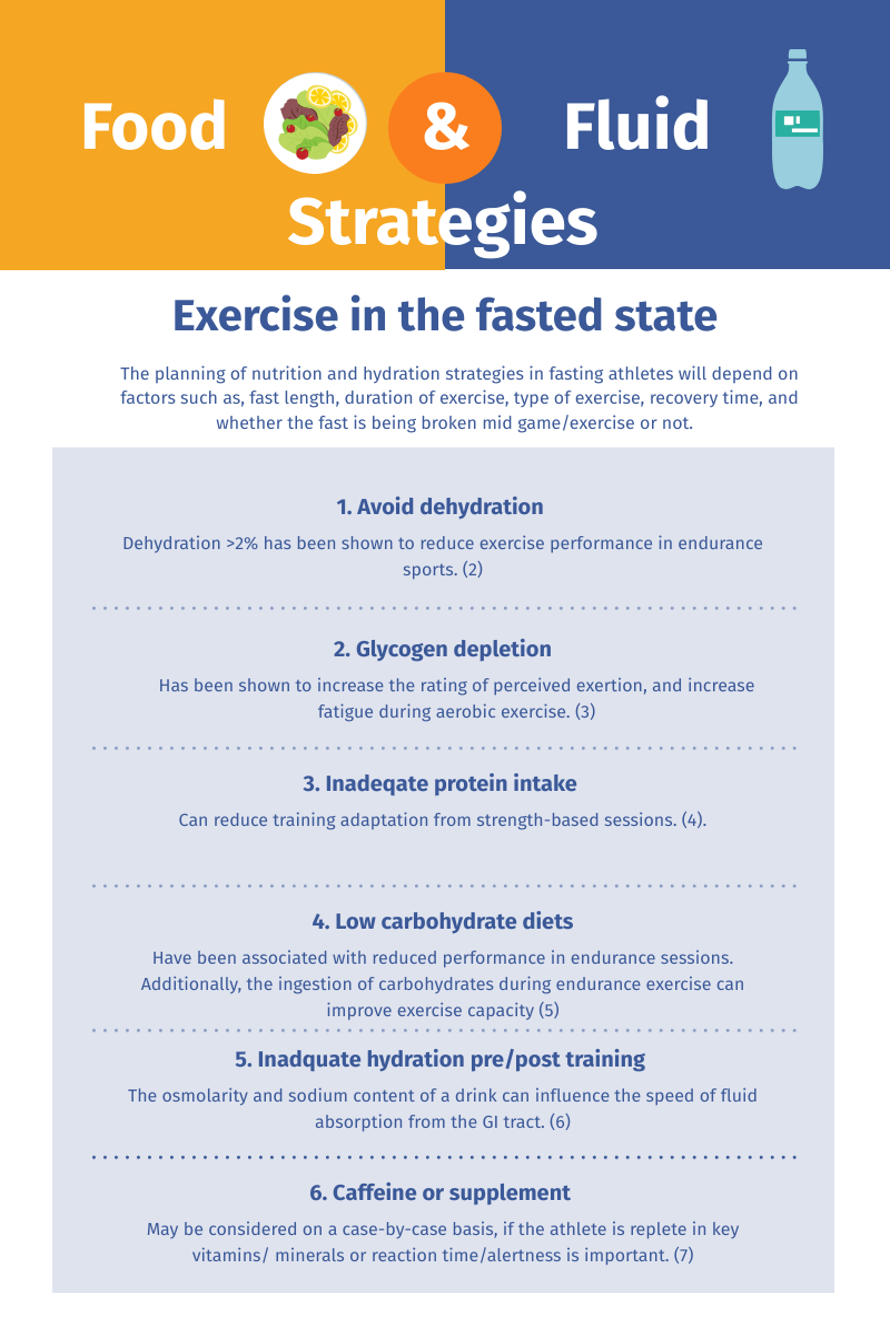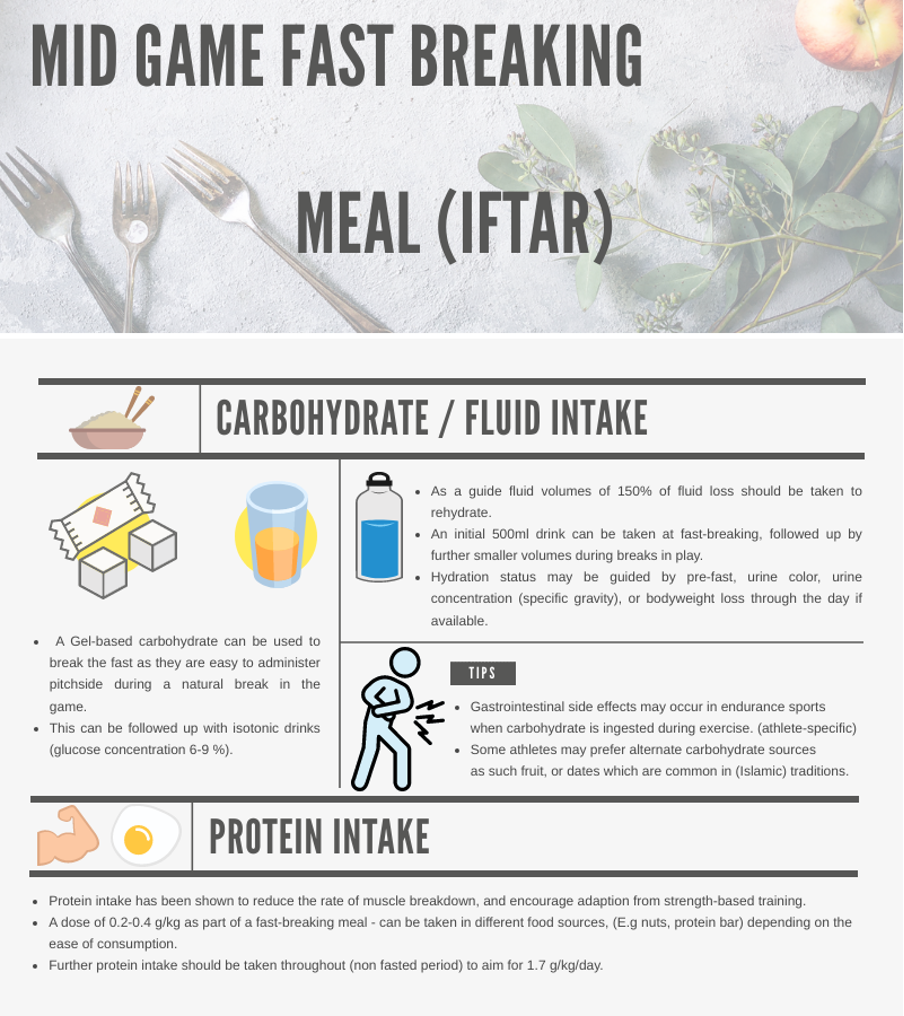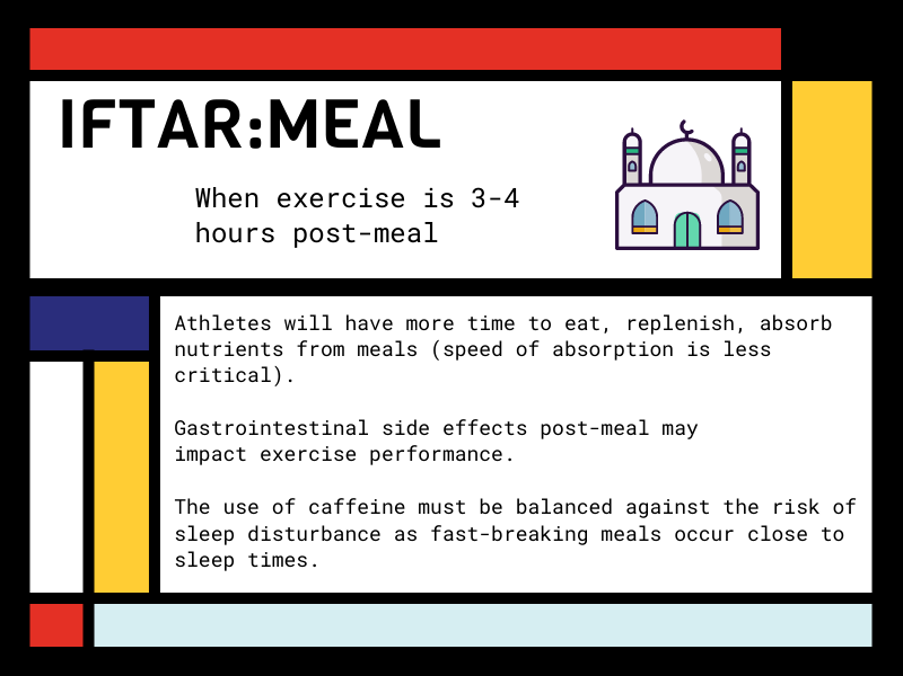For the competing athlete, refraining from the intake of food and fluids for religious or spiritual reasons during Ramadan can be a physical and mental challenge. Many athletes cite improved concentration, focus and discipline gained from this month – but recognise the physical challenges to maintain peak performance during this month. We discuss practical steps that SEM medical teams can take to support football players, breaking fast mid game, and how to plan for medical aspects of fasting.
Planning for peak performance; input from the sports medicine team
Players frequently consult medical staff to optimise nutrition and hydration strategies to best adapt to Ramadan. Currently there is a lack of detailed guidance to help inform athletes of specific lifestyle adaptations players could make to maximise performance. These would include: the specific content of meal for fast breaking (iftar) and how best to minimise any impact on performance, metabolism, or hydration levels. We discuss some key principles that could be applied to help design re-fuelling strategies for fasting athletes.

For practicing Muslim athletes, who fast, they will abstain from food and fluid intake this year for 30 days between sunrise and sunset. This is an annual religious month that will start from the beginning of April to early May this year. In the UK, typical fasts will be 16 hours in duration. For a typical premier league footballer, this may include 8 game days and daily training sessions to prepare for games. Previous high profile world competitions such as the FIFA Football World Cup 2010, Cricket World Cup 2019 and Olympics in 2012, have fallen within this month and are a major challenge to athletes who want to train and compete at the highest levels. (1) Optimisation of athletes requires recognition of Ramadan’s challenges on the human body and attempting to minimise the disruption to athletes’ regular schedule including nutritional intake, sleep and hydration.
Key areas to identify in preparation Matchday scenario – playing a football game and breaking fast mid-game
During a football match, players are subject to sharp bursts of anaerobic activity (high intensity sprints), on a background of longer phases of aerobic activity that on average are 70% of VO2max at the elite level. (8)
This requires players to maintain adequate carbohydrate and fluid intake, and strategies to optimise this mid game, when they break their fast. It is not practical to consume large meals, but gel-based snacks can help to replenish these optimally at the end of a 16 hour fast, when dehydration and glycogen depletion may be two key factors to correct. The co-administration of protein, with carbohydrates and isotonic drinks containing appropriate sodium content can improve intestinal absorption. (9)
Nutrition advice if breaking a fast mid game (endurance sport)
| Carbohydrate | Protein | Hydration – Volume | Hydration – Osmolarity | |
| Advice | Gels based aiming for 30-60g/hr. (10)
Single stat gels can be followed up with carbohydrate drinks. (6-8% concentration) (11) |
For a fast-breaking snack (0.2-0.4 g/kg) of protein –
with an aim to maintain a total daily protein intake of 1.7g/kg/day. (12)
Shown to improve muscle protein synthesis and improve body composition and performance outcomes. (13)
|
Aim to replace 150% of fluid loss during the session. (14)
150-300ml every 15 mins of exercise depending on weather conditions. (15)
Increase fluid volumes in extremes of heat/humidity or if evidence of dehydration pre fast break |
Aim for isotonic drinks of osmolarity 270 to 330 mOsm/L during prolonged aerobic exercise (football especially) (16)
Sodium (concentration 0.5 to 0.7 g of sodium / L) of water, improves GI absorption. (17)
|
| Example Meal | Glucose gel, followed by isotonic energy drinks.
Food first approach:
5 dates and a glass of milk/ chocolate milk |
Protein bar with at least 20g+ protein content
Food first approach:
handful of nuts/ trail mix (almonds, walnuts, cashews) |
500ml isotonic sports drink at fast breaking
Aim to supplement fluid intake every 10-15 mins, or in natural breaks in play. |
Osmolarity of drink between 270-330 mOsm/L is thought to optimise speed of absorption from GI tract.
|

Training scenario – Advice for a fasting athlete, that is training 2-3 hours after fast breaking (Iftar)
When athletes have several hours between fast breaking and exercise, due to later games times or training the speed of absorption is less critical. Athletes will have additional time to replenish glycogen, protein and fluid with a planned meal. Whilst there is inconclusive evidence on whether high or low GI carbohydrates are better for fasted exercise performance. (18)
Most guidance supports the use of smaller meals, with a mixture of carbohydrates that use different transporters to optimise GI absorption (19). Total daily protein should also be maintained, and pre-session protein has been shown to increase muscle protein and glycogen synthesis. The replenishment of fluids is vital following the opening of the fast to restore euhydrated conditions pre-exercise. Although mechanisms underlying dehydration, following chronic fluid restriction may be different to, post exercise dehydration, similar principles may be applied (20).

Pre-Training Scenario – Breaking a fast several hours before training
| Carbs | Protein | Hydration | Osmolarity | |
| Advice | Two small meals consisting of 70% carbohydrates- with a focus on slow releasing carbohydrates.
A meal containing 1.5g/kg consumed 1-4 hours before training, would be advised. (21)
|
Small portion of high quality, lean protein source (0.2g/kg)
Higher doses of protein may cause gastrointestinal irritation during event/ training so should be avoided.
Co-administration of protein and carbs may enhance pre-exercise glycogen synthesis (22)
|
Drink 1.5L for each 1kg of body mass deficit. (23)
Fluid intake should be encouraged over a prolonged period, rather than a single dose (bolus). Fluid intake should account for rehydration, and further fluid loss via urination – whilst rehydrating.
The goal of pre-hydrating is to start physical activity euhydrated and with normal body electrolyte status. Pre-hydrating with beverages should be initiated at least several hours before exercise to enable fluid absorption. (24)
|
When rehydrating from a hypo-hydrated post exercise state, fluids with electrolytes are preferred to plain water (e.g., milk or plain water, consumed with a meal containing electrolytes) (25)
|
Conclusion
- Pre-planning of meals to help athletes who are breaking fast (iftar) mid game, can help to optimise the speed, and mode of delivery of carbohydrate, protein and fluids sources.
- Key strategies include quick acting carbohydrates, co-ingested with protein and isotonic fluids to improve the speed of absorption.
- When athletes have several hours to refuel/ hydrate post meal (iftar)- then meals should be prepared to encourage re-fuelling, and limit GI side effects.
No competing interest
No relevant disclosures
Authors and Affiliations:
Dr Haseeb Rahman
Medical Student
University of Leeds
Twitter @Haseeb2502
Dr Irfan Ahmed
Sports and Exercise medicine Registrar & Family medicine (GP) practitioner
Homerton Hospital London
Twitter @Exerciseirfan
Reference List.
- Shephard R. The Impact of Ramadan Observance upon Athletic Performance. Nutrients. 2012;4(6):491-505.
- Barr S. Effects of Dehydration on Exercise Performance. Canadian Journal of Applied Physiology. 1999;24(2):164-172.
- Knuiman P, Hopman M, Mensink M. Glycogen availability and skeletal muscle adaptations with endurance and resistance exercise. Nutrition & Metabolism. 2015;12(1).
- Cataldo D. Protein intake for optimal muscle maintenance [Internet]. ACSM. 2015 [cited 7 March 2022]. Available from: https://www.acsm.org/docs/default-source/files-for-resource-library/protein-intake-for-optimal-muscle-maintenance.pdf
- Jeukendrup A. A Step Towards Personalized Sports Nutrition: Carbohydrate Intake During Exercise. Sports Medicine. 2014;44(S1):25-33.
- Rowlands D, Kopetschny B, Badenhorst C. The Hydrating Effects of Hypertonic, Isotonic and Hypotonic Sports Drinks and Waters on Central Hydration During Continuous Exercise: A Systematic Meta-Analysis and Perspective. Sports Medicine. 2021;52(2):349-375.
- Pedersen D, Lessard S, Coffey V, Churchley E, Wootton A, Ng T et al. High rates of muscle glycogen resynthesis after exhaustive exercise when carbohydrate is coingested with caffeine. Journal of Applied Physiology. 2008;105(1):7-13.
- Bangsbo J. Physiological Demands of Football [Internet]. Gatorade Sport Science Institute. 2014 [cited 7 March 2022]. Available from: https://www.gssiweb.org/sports-science-exchange/article/sse-125-physiological-demands-of-football
- Howarth K, Moreau N, Phillips S, Gibala M. Coingestion of protein with carbohydrate during recovery from endurance exercise stimulates skeletal muscle protein synthesis in humans. Journal of Applied Physiology. 2009;106(4):1394-1402.
- Burke L, Hawley J, Wong S, Jeukendrup A. Carbohydrates for training and competition. Journal of Sports Sciences. 2011;29(sup1):S17-S27.
- Rogers J, Summers R, Lambert G. Gastric Emptying and Intestinal Absorption of a Low-Carbohydrate Sport Drink during Exercise. International Journal of Sport Nutrition and Exercise Metabolism. 2005;15(3):220-235.
- Burke L, Collier G, Beasley S, Davis P, Fricker P, Heeley P et al. Effect of coingestion of fat and protein with carbohydrate feedings on muscle glycogen storage. Journal of Applied Physiology. 1995;78(6):2187-2192.
- Kerksick C, Arent S, Schoenfeld B, Stout J, Campbell B, Wilborn C et al. International society of sports nutrition position stand: nutrient timing. Journal of the International Society of Sports Nutrition. 2017;14(1).
- Fluids in Sport – Sports Dietitians Australia (SDA) [Internet]. Sports Dietitians Australia (SDA). 2022 [cited 20 March 2022]. Available from: https://www.sportsdietitians.com.au/factsheets/fuelling-recovery/fluids-in-sport/
- Latzka W, Montain S. water and electrolyte requirements for exercise. Clinics in Sports Medicine. 1999;18(3):513-524.
- Soares Fernandes H. Hydration Strategies for Elite Soccer Players. Scholarly Journal of Food and Nutrition. 2020;3(4).
- Von Duvillard S, Braun W, Markofski M, Beneke R, Leithäuser R. Fluids and hydration in prolonged endurance performance. Nutrition. 2004;20(7-8):651-656.
- Png W, Bhaskaran K, Sinclair AJ, et al. Effects of ingesting low glycemic index carbohydrate food for the sahur meal on subjective, metabolic and physiological responses, and endurance performance in Ramadan fasted men. Int J Food Sci Nutr. 2014;65(5):629-36.
- Jeukendrup A. Carbohydrate intake during exercise and performance. Nutrition. 2004;20(7-8):669-677.
- Huang W, Tung Y, Wu M, Liu M, Lin T, Yang M. Low-Osmolality Carbohydrate–Electrolyte Solution Ingestion Avoid Fluid Loss and Oxidative Stress after Exhaustive Endurance Exercise. Antioxidants. 2020;9(4):336.
- Rothschild J, Kilding A, Plews D. What Should I Eat before Exercise? Pre-Exercise Nutrition and the Response to Endurance Exercise: Current Prospective and Future Directions. Nutrients. 2020;12(11):3473.
- Ormsbee M, Bach C, Baur D. Pre-Exercise Nutrition: The Role of Macronutrients, Modified Starches and Supplements on Metabolism and Endurance Performance. Nutrients. 2014;6(5):1782-1808.
- Belval L, Hosokawa Y, Casa D, Adams W, Armstrong L, Baker L et al. Practical Hydration Solutions for Sports. Nutrients. 2019;11(7):1550.
- Sawka M, Burke L, Eichner E, Maughan R. Exercise and Fluid Replacement. Medicine & Science in Sports & Exercise. 2007;39(2):377-390.
- Evans G, James L, Shirreffs S, Maughan R. Optimizing the restoration and maintenance of fluid balance after exercise-induced dehydration. Journal of Applied Physiology. 2017;122(4):945-951.